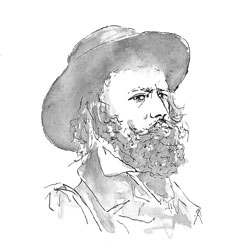Reading ‘Tears, idle tears’ (4): Contextualising the poem as an ’embedded lyric’ in ‘The Princess’
Tears, idle tears, I know not what they mean,
Tears from the depth of some divine despair
Rise in the heart, and gather to the eyes,
In looking on the happy Autumn-fields,
And thinking of the days that are no more.Fresh as the first beam glittering on a sail,
That brings our friends up from the underworld,
Sad as the last which reddens over one
That sinks with all we love below the verge;
So sad, so fresh, the days that are no more.Ah, sad and strange as in dark summer dawns
The earliest pipe of half-awaken'd birds
To dying ears, when unto dying eyes
The casement slowly grows a glimmering square;
So sad, so strange, the days that are no more.Dear as remember'd kisses after death,
And sweet as those by hopeless fancy feign'd
On lips that are for others; deep as love,
Deep as first love, and wild with all regret;
O Death in Life, the days that are no more.
One final and very important way in which Professor Glen goes beyond 'the words on the page' in order to contextualise 'Tears, idle tears' is by exploring the poem's status not as an autonomous entity but as one of a number of 'embedded' lyrics within Tennyson's longer poem The Princess. The Princess tells the story of Princess Ida (who also became the central character in a , her initial rejection of marriage, her later decision to establish a university for women, and her eventual transformation of that university into a hospital. Whereas, as Professor Glen highlights, this 'frame text', The Princess, 'ponders many of the progressivist discourses of its day' (from evolutionary theory to feminism), 'Tears, idle tears' and all the other framed texts 'embody useless and irrational emotions... opposed to the active intellectual progressivism of Princess Ida'.
Moreover, Professor Glen draws important attention towards a passage in The Princess which immediately follows the embedded lyric we've been reading. Professor Glen highlights how, in that passage, Princess Ida directly passes judgment on the girl who sings 'Tears, idle tears':
She [the girl] ended with such passion that the tear
She sang of, shook and fell, an erring pearl
Lost in her bosom: but with some disdain
Answer'd the Princess, If indeed there haunt
About the moulder'd lodges of the Past
So sweet a voice and vague, fatal to men,
Well needs it we should cram our ears with wool
And so pace by: but thine are fancies hatch'd
In silken-folded idleness.
Seeing as Princess Ida explicitly condemns the weeper's 'idleness', perhaps she has (and perhaps Tennyson has) the same attitude towards the 'habitual indulgence' that Leavis reacted against? So if Tennyson thus dramatises both 'idleness' and Ida's conventional condemnation of 'idleness' in 'Tears, idle tears' and its frame poem The Princess, is it not perhaps unfair to accuse him of endorsing habitual indulgence?
'Idle', Professor Glen highlights, is 'one of the strongest and most striking words in Tennyson's poem. The Oxford English Dictionary definition of the word is 'serving no purpose' or 'of persons, not engaged in work'. Embedded within a frame poem which recognised and dramatised the extent to which Tennyson's age was one of 'purposeful , useful toil and useful knowledge' perhaps, Professor Glen suggests, 'Tears, idle tears' may be seen as 'a riposte' or 'counterpoint to that rhetoric of progress' which characterised Tennyson's era.
'Trailing off rather than ending', 'not completed and rounded off by rhyme' and neither offering closure nor 'a sense of personal or aesthetic resolution', this lyric's 'failure to do what Leavis asks it to do' may, Professor Glen concludes, be its point. How does this make you feel about 'Tears, idle tears', and does this cause you to question the New Critics' seemingly self-evident idea that all one ought to attend to, when inquiring about a poem's meaning, are 'words on the page'?
Let's take a look at just one more interpretation of the poem, presented in the final chapter of a book by Herbert F. Tucker called Tennyson and the Doom of Romanticism.
Click here to continue to the next part of this close reading of Tennyson's 'Tears, idle tears'.
